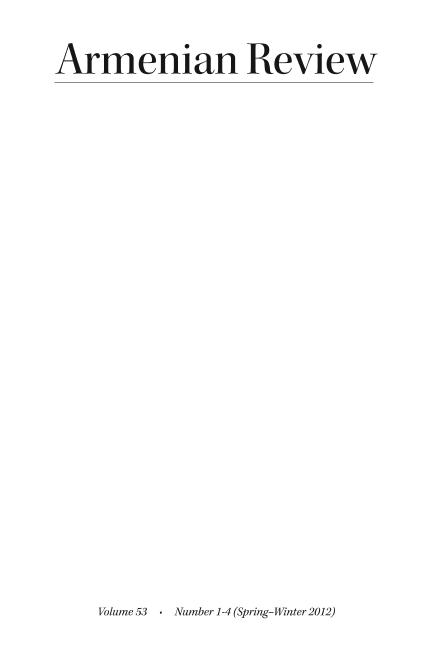Mostrar el registro sencillo del ítem
dc.contributor.author
Lenton, Diana Isabel

dc.contributor.author
Delrio, Walter Mario

dc.contributor.author
Pérez, Pilar María Victoria

dc.contributor.author
Papazian, Alexis Esteban Roberto

dc.contributor.author
Nagy, Mariano Ariel

dc.contributor.author
Musante, Marcelo
dc.date.available
2023-05-15T14:20:50Z
dc.date.issued
2012-07
dc.identifier.citation
Lenton, Diana Isabel; Delrio, Walter Mario; Pérez, Pilar María Victoria; Papazian, Alexis Esteban Roberto; Nagy, Mariano Ariel; et al.; Constituent Genocide in Argentina: the Question on Reparation; Worcester; Armenian Review; 53; 1-4; 7-2012; 63-84
dc.identifier.issn
0004-2366
dc.identifier.uri
http://hdl.handle.net/11336/197488
dc.description.abstract
For more than a century, there has been little discussion of the Argentinean genocide perpetrated against indigenous peoples. As a result, presently a majority of Argentines perceive their identity and society as the outcome of a “European melting pot” process, not the result of genocide. In this view, sixteenth century European colonization of a territory imagined as a “desert” and the expansion of the nation-state by the late 19th Century are the historical processes that account for this melting pot. This article deals with the events and effects of the last period of territorial annexation and subjugation of the indigenous peoples perpetrated by the Argentinean national armed forces between 1876 and 1917, focusing on the state’s genocidal policies and the support from civil society. Paradoxically, these actions as a whole have been named in the hegemonic national history of Argentina’s “Campaigns to the Desert.”1 This formulation and the national narratives it names minimize or deny completely the existence of indigenous peoples in the areas annexed. The aim of this paper is to examine the construction and effects of the genocide of the indigenous population as an event excluded from the national narrative and literally “unthinkable” by average Argentines. In the present, different groups – such as indigenous peoples’ organizations, academic researchers, and alternative media – have started to make visible this genocidal process that is constitutive of the Argentinean nation state. The exposure of the facts of history has generated a growing debate on the historical processes. In this context, a series of specific but related processes of violence and conquest can be identified and described. We term these “genocide-prints,” through which we will consider not only the genocide but also the current debates on reparations to indigenous peoples.
dc.format
application/pdf
dc.language.iso
eng
dc.publisher
Worcester
dc.rights
info:eu-repo/semantics/openAccess
dc.rights.uri
https://creativecommons.org/licenses/by-nc-sa/2.5/ar/
dc.subject
Genocide
dc.subject
Argentina
dc.subject
Reparation
dc.subject
Monuments
dc.subject.classification
Otras Ciencias Sociales

dc.subject.classification
Otras Ciencias Sociales

dc.subject.classification
CIENCIAS SOCIALES

dc.title
Constituent Genocide in Argentina: the Question on Reparation
dc.type
info:eu-repo/semantics/article
dc.type
info:ar-repo/semantics/artículo
dc.type
info:eu-repo/semantics/publishedVersion
dc.date.updated
2023-05-08T13:22:44Z
dc.identifier.eissn
0004-2366
dc.journal.volume
53
dc.journal.number
1-4
dc.journal.pagination
63-84
dc.journal.pais
Estados Unidos

dc.journal.ciudad
Masachussets
dc.description.fil
Fil: Lenton, Diana Isabel. Universidad de Buenos Aires. Facultad de Filosofía y Letras. Instituto de Ciencias Antropológicas; Argentina. Consejo Nacional de Investigaciones Científicas y Técnicas; Argentina
dc.description.fil
Fil: Delrio, Walter Mario. Consejo Nacional de Investigaciones Científicas y Técnicas. Centro Científico Tecnológico Conicet - Patagonia Confluencia; Argentina
dc.description.fil
Fil: Pérez, Pilar María Victoria. Consejo Nacional de Investigaciones Científicas y Técnicas. Centro Científico Tecnológico Conicet - Patagonia Norte. Instituto de Investigaciones en Diversidad Cultural y Procesos de Cambio. Universidad Nacional de Río Negro. Instituto de Investigaciones en Diversidad Cultural y Procesos de Cambio; Argentina
dc.description.fil
Fil: Papazian, Alexis Esteban Roberto. Universidad de Buenos Aires. Facultad de Filosofía y Letras. Instituto de Ciencias Antropológicas; Argentina. Consejo Nacional de Investigaciones Científicas y Técnicas; Argentina
dc.description.fil
Fil: Nagy, Mariano Ariel. Universidad de Buenos Aires. Facultad de Filosofía y Letras. Departamento de Ciencias Antropológicas; Argentina. Consejo Nacional de Investigaciones Científicas y Técnicas; Argentina
dc.description.fil
Fil: Musante, Marcelo. Universidad de Buenos Aires. Facultad de Filosofía y Letras. Departamento de Ciencias Antropológicas; Argentina
dc.journal.title
Armenian Review
Archivos asociados
